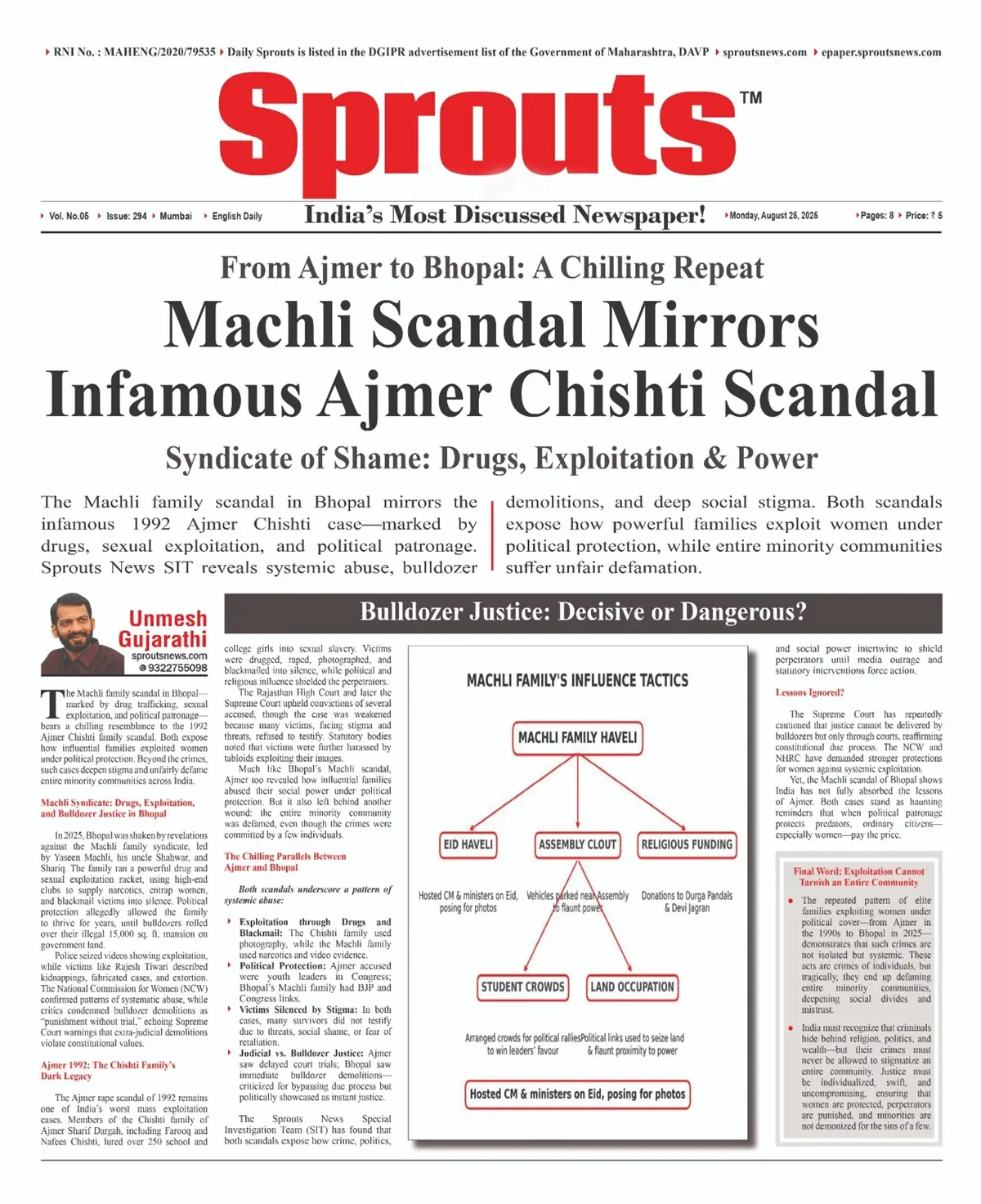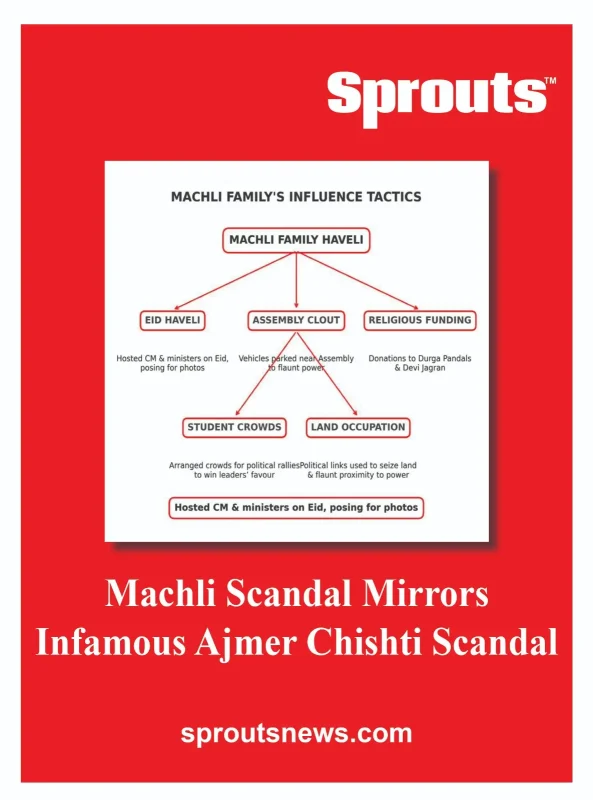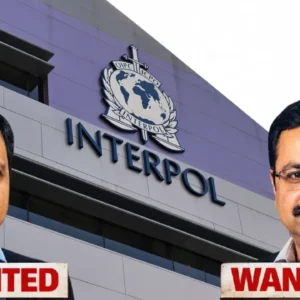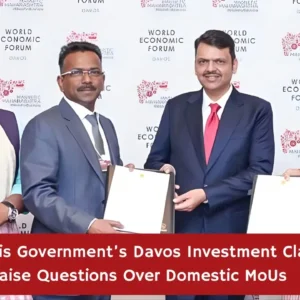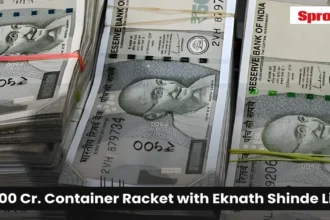Machli Scandal Mirrors Infamous Ajmer Chishti Scandal
· From Ajmer to Bhopal: A Chilling Repeat
· Syndicate of Shame: Drugs, Exploitation & Power
· Bulldozer Justice: Decisive or Dangerous?
Unmesh Gujarathi
Sprouts News Exclusive
Contact: +91 9322755098
Sprouts News Exclusive
Contact: +91 9322755098
The Machli family scandal in Bhopal mirrors the infamous 1992 Ajmer Chishti case—marked by drugs, sexual exploitation, and political patronage. Sprouts News SIT reveals systemic abuse, bulldozer demolitions, and deep social stigma. Both scandals expose how powerful families exploit women under political protection, while entire minority communities suffer unfair defamation.
The Machli family scandal in Bhopal—marked by drug trafficking, sexual exploitation, and political patronage—bears a chilling resemblance to the 1992 Ajmer Chishti family scandal. Both expose how influential families exploited women under political protection. Beyond the crimes, such cases deepen stigma and unfairly defame entire minority communities across India.
Machli Syndicate: Drugs, Exploitation, and Bulldozer Justice in Bhopal
In 2025, Bhopal was shaken by revelations against the Machli family syndicate, led by Yaseen Machli, his uncle Shahwar, and Shariq. The family ran a powerful drug and sexual exploitation racket, using high-end clubs to supply narcotics, entrap women, and blackmail victims into silence. Political protection allegedly allowed the family to thrive for years, until bulldozers rolled over their illegal 15,000 sq. ft. mansion on government land.
Police seized videos showing exploitation, while victims like Rajesh Tiwari described kidnappings, fabricated cases, and extortion. The National Commission for Women (NCW) confirmed patterns of systematic abuse, while critics condemned bulldozer demolitions as “punishment without trial,” echoing Supreme Court warnings that extra-judicial demolitions violate constitutional values.
Ajmer 1992: The Chishti Family’s Dark Legacy
The Ajmer rape scandal of 1992 remains one of India’s worst mass exploitation cases. Members of the Chishti family of Ajmer Sharif Dargah, including Farooq and Nafees Chishti, lured over 250 school and college girls into sexual slavery. Victims were drugged, raped, photographed, and blackmailed into silence, while political and religious influence shielded the perpetrators.
The Rajasthan High Court and later the Supreme Court upheld convictions of several accused, though the case was weakened because many victims, facing stigma and threats, refused to testify. Statutory bodies noted that victims were further harassed by tabloids exploiting their images.
Much like Bhopal’s Machli scandal, Ajmer too revealed how influential families abused their social power under political protection. But it also left behind another wound: the entire minority community was defamed, even though the crimes were committed by a few individuals.
The Chilling Parallels Between Ajmer and Bhopal
Both scandals underscore a pattern of systemic abuse:
•Exploitation through Drugs and Blackmail: The Chishti family used photography, while the Machli family used narcotics and video evidence.
•Political Protection: Ajmer accused were youth leaders in Congress; Bhopal’s Machli family had BJP and Congress links.
•Victims Silenced by Stigma: In both cases, many survivors did not testify due to threats, social shame, or fear of retaliation.
•Judicial vs. Bulldozer Justice: Ajmer saw delayed court trials; Bhopal saw immediate bulldozer demolitions—criticized for bypassing due process but politically showcased as instant justice.
The Sprouts News Special Investigation Team (SIT) has found that both scandals expose how crime, politics, and social power intertwine to shield perpetrators until media outrage and statutory interventions force action.
Lessons Ignored?
The Supreme Court has repeatedly cautioned that justice cannot be delivered by bulldozers but only through courts, reaffirming constitutional due process. The NCW and NHRC have demanded stronger protections for women against systemic exploitation.
Yet, the Machli scandal of Bhopal shows India has not fully absorbed the lessons of Ajmer. Both cases stand as haunting reminders that when political patronage protects predators, ordinary citizens—especially women—pay the price.
Final Word: Exploitation Cannot Tarnish an Entire Community
The repeated pattern of elite families exploiting women under political cover—from Ajmer in the 1990s to Bhopal in 2025—demonstrates that such crimes are not isolated but systemic. These acts are crimes of individuals, but tragically, they end up defaming entire minority communities, deepening social divides and mistrust.
India must recognize that criminals hide behind religion, politics, and wealth—but their crimes must never be allowed to stigmatize an entire community. Justice must be individualized, swift, and uncompromising, ensuring that women are protected, perpetrators are punished, and minorities are not demonized for the sins of a few.


